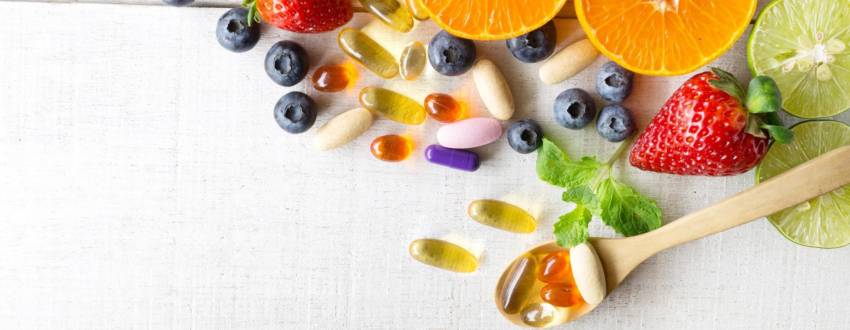Growing up, I never bothered to question why it was so important to take vitamins, because the chewable tablets and gummies I used to take were like candy for breakfast. Now that I’m a bit older, I really feel the effects of what I eat, and after so much social distancing I feel like everyone is feeling a little depressed, achy, and stressed.
Vitamins won’t necessarily cure these ailments overnight but ensuring that you’re getting enough vitamins may help mitigate them.
The following is general information; please always consult your physician or seek professional medical advice with regards to your dietary and health needs.
Why Do We Need Vitamins?
The body is a complicated machine that needs more than just fuel to function. Vitamins play a role in complicated bodily functions from healing to energy processing, and even basic communication between cells.
Think about all the different parts of a car. Gasoline is the fuel that powers the engine, but a car also needs things like oil to lubricate its engine parts and special fluid for the brakes, it needs to be washed with soap that won’t corrode its paint, and so on.
Our bodies are similar in that they need many different resources to function properly, and it’s hard to get them all in one place – not even from all the foods we eat.

Why Doesn’t Our Food Have Enough Vitamins?
Sometimes our food has an abundance of vitamins, and sometimes it doesn’t. In many cases, non-organic foods lack vitamins due to how they are produced. If the soil in which a plant grows is full of nutrients, the plant be full of nutrients. If an animal is raised on a healthy diet, its meat will be full of nutrients.
But if the soil is deficient in nutrients, and the plant is hastily grown and harvested, then the food won’t have as many vitamins. If cattle is fed mostly corn instead of grass, its meat will be fattier and not as nutrient-dense.
In most cases, the lack of nutrients and hasty production of food has to do with mass production and cost – it’s cheaper and faster not to worry about nutrients in foods – so we often need to take vitamin supplements.
Two Types of Vitamins
Fat-soluble vitamins are dissolved and stored in the liver or fatty tissue in the body to be used when needed. Examples include vitamins A, D, E, and K. One reason you need to have some fat in your diet is so that you can absorb fat-soluble vitamins through the intestinal tract.
Water-soluble vitamins such as Vitamins B and C can be absorbed directly into the bloodstream and excess vitamins leave the body via the urine. This explains why we need a more regular supply of Vitamin C – be sure to eat your oranges!
Some Essential Vitamins That Help You Feel Better
Vitamin B Complex
Vitamin B Complex refers to eight types of vitamin B which all play essential roles in energy levels and brain function. All eight are known for having a significant impact on mood and stress regulation.
So many types of foods that we eat, from meat and vegetables to dairy, fruits, and grains, naturally contain B vitamins that most people do not need supplements… but if most of what you eat is unhealthy, mass-produced food, you might want to consider healthier alternatives of the same food, such as pasture-raised beef or locally grown produce.
You wouldn’t necessarily see changes overnight, but a healthier overall diet rich in B vitamins should help improve your mood and enable your body to mitigate stress.
Some significant B vitamins include:
- Riboflavin (Vitamin B2)
Riboflavin is an essential component in metabolizing carbohydrates and calories, which give us energy. If you don’t get enough riboflavin, you could experience skin disorders, hair loss, cracked lips, and sores in your mouth.

Scientists are currently investigating the immediate potential of Riboflavin to treat headaches and migraines. Some studies show promising results, and others do not. The good news is taking riboflavin supplements is not known to be harmful or interfere with medication, but it is always advisable to consult a medical expert before making significant changes to your diet.
Eggs, organ meats such as liver, lean meats such as fish, and green vegetables like broccoli and asparagus are all great sources of Riboflavin. It’s also a common vitamin in fortified grains.
- Niacin (Vitamin B-3)
Vitamin B-3 is known for the production of serotonin, a hormone that helps stabilize your mood among other things.
According to the National Institute of Health, beef, fish, and poultry are all good sources of niacin, and most fruits and vegetables provide some niacin. Enriched grains can also be a good source of niacin.
Vitamin C

Commonly known for boosting the immune system, vitamin C also plays an essential role in modulating neurotransmitter synthesis, in other words, vitamin C helps your brain send and receive chemical messages.
The exact role and function vitamin C has with regulating depression and anxiety specifically is still being researched, but vitamin C is well known for preventing diseases like scurvy, so it’s always good to make sure you’re getting enough for your overall health if nothing else.
Citrus fruits like oranges, lemons, limes, and grapefruits are all rich in Vitamin C. Other good sources include potatoes, broccoli, and strawberries.
Learn more about oranges and vitamin C.
Vitamin D

The D in vitamin D doesn’t actually stand for depression, but you can pretend it does to help you remember what you might be lacking when you’re feeling down.
It’s not abundantly clear to science why vitamin D levels affect mood, if at all. Many studies have seen a significant correlation with mental health ailments and vitamin D deficiency, but it’s not clear if a lack of vitamin D is causation or if taking vitamin D supplements will affect your mood.
One thing that we can be sure of, however, is that it is important and healthy to get enough vitamin D. One thing we are sure of is that vitamin D helps the body absorb calcium, which makes our bones stronger. Without vitamin D, the body will start to “borrow” calcium from your bones in order to maintain a standard level of calcium in the bloodstream. That sounds like it could really make you ache!
Fatigue is another common symptom of vitamin D deficiency, but it’s unclear if taking vitamin D will boost your energy. That said, it is believed that vitamin D plays a significant role in helping cells use oxygen and process energy.
Vitamin D food sources include fish, red meat, liver, and egg yolks.
Vitamin E
Most essential vitamins can help with muscle pains and recovering from injuries, and vitamin E in particular is often associated with improving circulation. This can alleviate many types of muscle cramps and aches.
It’s worth noting that while vitamin E is relatively harmless when consumed in regular amounts, there is such a thing as too much vitamin E, which in extreme cases can lead to blood thinning. This is usually the result of taking too many vitamin E supplements and not following recommended guidelines provided by physicians and healthcare professionals or taking vitamin E in hopes of curing heart disease.
Foods rich in vitamin E include plant oils such as olive or avocado and all kinds of nuts and seeds.
Overall Happiness Is Based on Overall Health

In researching this article, I was surprised to learn that vitamins don’t work like medicine in the sense that eating your vitamins won’t necessarily instantly relieve your symptoms or change your mood overnight.
I never realized there could be such a thing as taking too many vitamins that could lead to serious complications, and that some physicians cautioned us not to think of vitamins in terms of miracle treatments for serious conditions such as heart disease.
While we can’t always rely on vitamins for immediate cure or relief, making a habit of eating a balanced diet rich with vitamins and nutrients is one of the pillars to sustaining health and happiness.
And eating healthy is a great experience when you have access to countless delicious kosher recipes. To add more vitamins to every meal, simply include a variety of dishes, like pairing your favorite soups or salads with your favorite main dishes.






Reviews